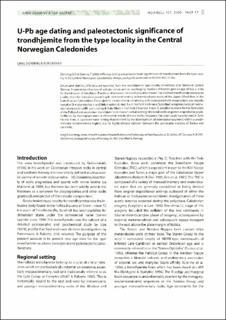U-Pb age dating and paleotectonic significance of trondhjemite from the type locality in the Central Norwegian Caledonides
Abstract
Zircon and titanite U-Pb data are reported from the trondhjemite type locality at Follstad, near Støren in Central Norway. A concordant fraction of aricular zircon and an overlapping fraction of titanite give an age of 432+- 3Ma for the intrusion of the pluton. Fractions of prismatic zircon display inheritance. The Follstad trondhjemite represents a suite of similar intrusions occurring in metasedimentary and metavolcanic rocks of the Upper Allochthon in the Scandinavian Caledonides. Trondhjemite emplacement commonly with associated mafic magmatism, was broadly coeval with metamorphism and deformation during the climatic Caledonian (Scandian) orogenic event, immediately before rapid uplift and cooling in Late Silurian and Early Devonian times. A possible scenario for the formation of the Follstad and equivalent trondhjemites is that of partial melting of crustal rocks at garnet-amphibolite grade, facilitated by the emplacement of rift-related, mantle-derived mafic intrusions. The latter could have formed, in Early Silurian time, in a paleotectonic setting characterised by the development of extensional segments within a predominantly transpressional regime, due to highly oblique collision between the convergin margins of Baltica and Laurentia.

